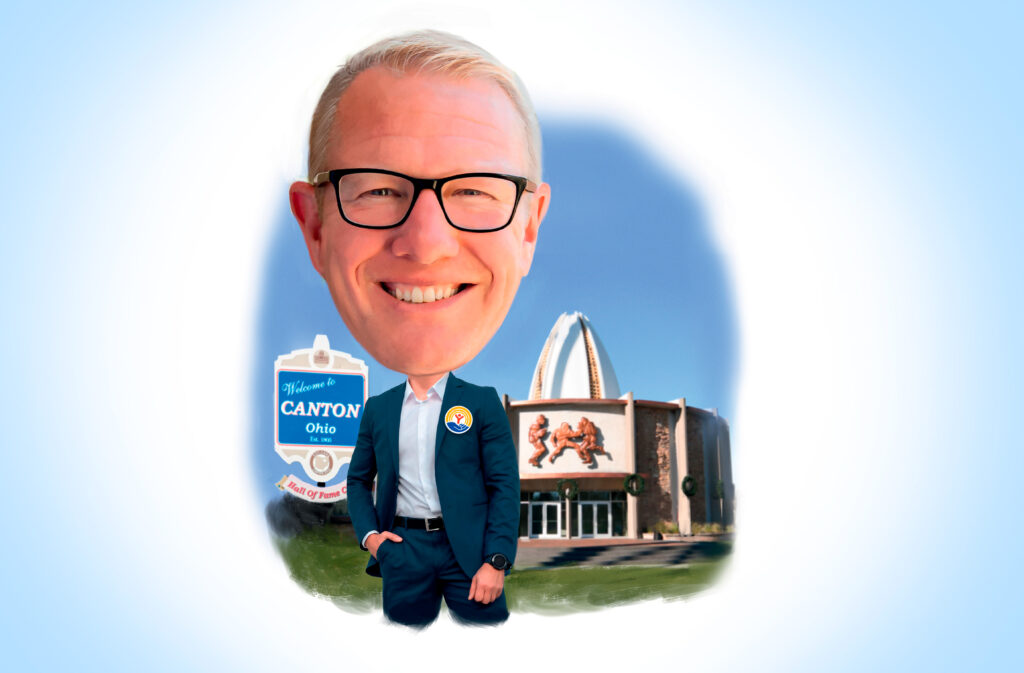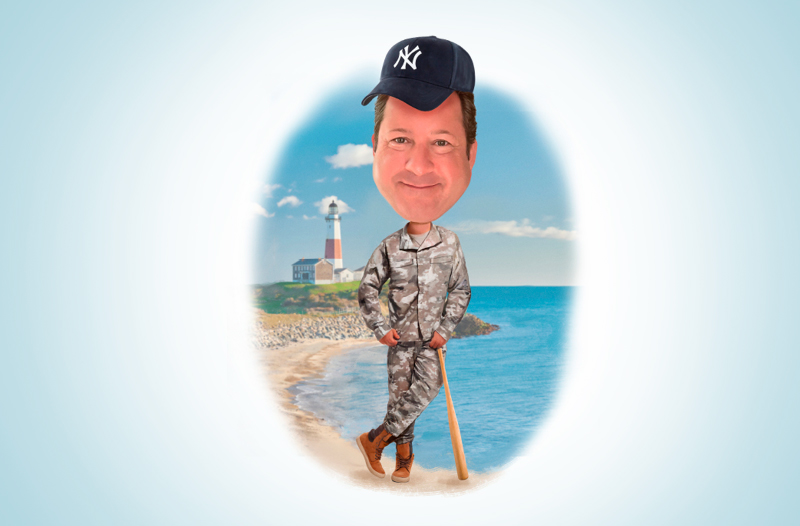
A Different Kind of Mogul

When J. Powell Brown graduated from the University of Florida in 1989, he had a choice: work or goof off. He chose to become a ski bum.
It was an inauspicious start to a career destined to take him to the top of Brown & Brown, the world’s seventh-largest insurance broker, particularly since as the eldest son of hard-charging J. Hyatt Brown, he had been groomed for this all his life. And Hyatt had little tolerance for slackers at his Daytona Beach, Florida-based company. “If you put your shoulder to the wheel you will rise,” says Hyatt, adding, “If not…you won’t be with us.”
But Powell’s initial career move took him to Aspen, where he spent a year waxing skis, waiting tables and searching for the highest, whitest powder on the mountain. Fraternity friends like Duane Draper, who was about to enter law school, scratched their heads. “Powell had always dialed it up, even when we were dialing down,” says Draper. He had been disciplined, decisive and—despite coming from a wealthy family with three generations in the brokerage business—ingrained with a sense that he had to set goals and accomplish them himself.
Turns out, he was. After a year on the slopes, Powell came back and started to climb a different mountain. “He knew what he was doing all along,” says Draper. “He recharged his batteries—indulged that sense of adventure he’s always had. And he’s never had to look back and kick himself for not having done it.”
Powell started as a trainee with Continental Insurance and then became an underwriter, earning the right to come back and work for his father. He went on to get his MBA in 1995 from Duke University, meeting his wife, Nancy, who was in the class immediately following his. He then climbed the ladder at Brown & Brown, rising from account executive to marketing manager to president. At 42, he replaced his 72-year-old father, Hyatt, as CEO in July 2009.
Did he get there because his name is Brown? It helped, although not in the obvious way. If anything, the bar is set higher for Powell. Brown & Brown is a public corporation, answerable to institutional shareholders who control 60% of its stock. Its mantra, “an American meritocracy” sounds hollow if Powell Brown fumbles.
A Year in Hell
Powell’s father, Hyatt, did him no favors by putting him in charge just when things are toughest. “The economy is in the worst shape it’s been since I started working in 1959,” the elder Brown admits. That lowers insurance premiums, which, in turn, cuts commissions.
“All the tailwinds that were helping the industry have turned to headwinds,” says Nik Fisken, an analyst with Stephens Inc. The Florida peninsula, which is Brown & Brown’s backyard and accounts for 30% of its revenue, remains a battleground between insurers and state government. Unemployment is more than 12% and even higher in previously well-off areas like Fort Myers and Naples.
Finally, Brown & Brown’s crown jewel, its ability to identify and acquire great brokerages across the U.S., has taken a big hit in this depressed market. With prices down, fewer brokerages want to sell. In 2009, Brown & Brown acquired less than a quarter of the new brokerage revenue it did the previous year.
Last December, Powell gave a presentation at the J.P. Morgan Mid Cap Conference. Within a few days, the investment bank told investors to “underweight” the stock, claiming Brown & Brown’s middle-market and U.S.-based business model “lacks international exposure” that helps its competitors during the recession.
“Two thousand nine was a year in hell,” CFO Cory Walker told analysts after the company’s fourth-quarter earnings fell nearly 30% from a year earlier.
Make No Big Mistakes
So Powell is facing an early stress test, professionally and personally. He’s in charge of people like Linda Downs, a 30-year veteran executive who remembers meeting 12-year-old Powell when she came to Hyatt’s for dinner. Now Powell manages 180 U.S. brokerage offices, all decentralized and semi-independent, forcing him, like his father before him, to put in regular 12-hour days and “live on a jet,” as former vice chairman and COO Jim Henderson puts it, crisscrossing the country from Florida to Washington state. Brown knows earnings—at least for a while—aren’t going to make investors happy; the stock is more than 50% off its high-water mark in 2006.
Is he rattled? No. “I know the economy has dramatically affected our business, but I sleep fine,” says Powell. And analysts agree. “He’s a solid leader who will make no big mistakes,” predicts Fisken. He’ll stay in the “middle market,” where the average client generates about $125,000 in premiums annually and where the largest brokerages don’t put in their “A Teams” the way Brown & Brown does. He’ll also continue the Brown & Brown culture defined by his father and his grandfather before him.
Beginning of a Dynasty
The Browns have a long heritage, both in the country and in brokerage. They choose names from a “family book” which dates back to North Carolina in the 1700s. “Powell” was the maiden name of his great-grandmother. “Hyatt” is also a family name that dates back generations, as was his grandfather’s, J. Adrian Brown (the J is for James). Powell has followed that naming tradition with his four children: son, Preston, and daughters, Baldwin, Dempsey and Rory.
J. Adrian Brown came to Florida in 1914, married and then founded the firm in 1939. In 1959, Hyatt joined the brokerage then bought the firm from his father in 1961. At the time, it was a modest business with $64,000 in revenue, and Hyatt made $1,400 in income.
Then in 1980, Hyatt made a fateful decision. “We decided to put the pedal to the metal and grow like crazy,” he recalls. But there were a few speed bumps along the way. As revenue grew, profit margins fell. Hyatt found an expert he trusted who told him 10 things to do. Hyatt did them all, and the Brown & Brown culture was born.
Part of that culture is the family image itself, “just plain folks,” polite and distinctly southern. That fits in with B&B’s “decentralized” model, under which every office runs itself and does its own profit and loss statement right down to the paper supplies. “Decentralized” is Brown’s code word for entrepreneurial. No one from the central office forces programs down their throats.
“Our people enjoy that freedom a lot,” says Henderson, who retired in August. “No one is telling them, ‘You have to buy this; you have to pay that.’ Freedom attracts good people.” While retailers take on the company name when they join Brown & Brown, wholesale offices, which deal with other brokers, keep their own.
Doing Business the Brown Way
Brown & Brown uses the same hometown approach when it makes acquisitions: It learns about the companies it buys by competing against them. “Our biggest competitor is not a large, publicly traded broker; it’s the best local agency in each town,” says Powell. Such an agency, with 20 to 500 employees, is usually run by a guy Hyatt calls “the horse” because he pulls the whole town along. He’s been head of the Chamber of Commerce, everyone knows him, and his social connections make it impossible to take away his business.
But even horses tire, and many smaller brokerages are run by the middle-aged men and women who started them. Their goal now is to take money out of the business and move toward retirement, a process that may accelerate as the Bush tax cuts on capital gains expire at the end of this year. That puts them at odds with their aggressive young producers who feel stifled in their ability to rise and don’t want to take a financial haircut when the boss bows out.
Brown & Brown’s top executives start a courtship process, meeting with these brokers several times at conferences or individually, to see if the prospect fits into the B&B culture. Brown & Brown opens up its own financials to show the prospect how it functions.
“It’s like marriage,” says Downs, who as a regional executive vice president negotiated several deals. “We date until we’re sure. We have no secrets. We share how our model works. Some will take what we say and implement it and that makes them more valuable when they do sell. That’s OK with us.”
If that sounds like the “measures of deep compatibility” that some Internet romance services offer, well, perhaps it is. “Cultural fit comes first, the way they relate to fellow brokers, insurance carriers and clients,” says Powell. “Then we talk about how much we can pay.”
Dig Deep to Find the Right People
Critical to any acquisition is a peek at the people coming up in the ranks. “Our business is decentralized, which makes it harder to find leaders,” says Powell. “But once you have those leaders, it makes it easier to operate.”
Before buying a brokerage, Brown & Brown digs down and finds the hungry and the talented, the next generation of leadership. This is the group that wants to swim in a bigger fish tank. With B&B, they’ll get the opportunity to swim, sink—or rise to the top as the torch is passed.
Jim Cherf, president of Canfield & Associates, the Brown & Brown wholesale operation in Ephrata, Wash., is one of them. Cherf joined Canfield in the summer of 2003, after a career as a city manager, and by September the firm had been sold. “It was a surprise—but a pleasant surprise,” says Cherf.
Powell, who was the direct liaison for the acquisition, spent days discussing the business, and the two became friends. Powell accepted the old management’s suggestion that Cherf, despite being a relative newcomer, take the reins. “Now we are almost three times bigger than when they purchased us,” says Cherf.
That’s typical. With Brown & Brown, no one finds out they’ve been acquired by email. The regional manager is involved in negotiating the purchase, since he or she will ultimately be responsible for the operation going forward. “We want the day after the acquisition to be like the day before,” says Downs. Powell, with his college-boy good looks, broad smile and unfailing Southern charm, is perfect for this. “He knows the names of your kids, and he’s not ashamed to kneel down and talk to them,” says Cherf.
Independence Demands Accountability
But while Powell and his family may be just folks, they are folks with a strong profit motive and a ruthless defense of their reputation. Until the recent setbacks, Brown & Brown was able to boost earnings by 15% a quarter, year-in and year-out. And if the company culture offers independence, it also demands accountability—not only at every office, but in every unit of that office. “We are very competitive,” says Hyatt proudly, “and we weigh and measure everyone.” Expenses are down-streamed, and internal audit teams “trust but verify,” says Henderson.
The competitive atmosphere comes to a pinnacle at quarterly meetings chaired by Powell, which are like “Texas hold ’em” poker games, where players compete against each other with most of their cards face up on the table. The home office gathers detailed information from its 180 agencies and shares it with all of them. Then the heads of all the offices meet in Orlando to talk about what’s working and what’s not. “It’s two days of very intense work,” says Cherf.
As both profits and acquisitions have waned, at least for the moment, the Browns haven’t lost their vision. But they have refocused and are finding new talent in industries such as banking and real estate that have been beaten up by the recession. That’s where Hyatt, now 73, is putting much of his energy and, next to his progeny, he’s proudest of “Brown & Brown University,” three schools across the nation that educate employees on insurance products and improving sales skills.
Wall Street Meets Main Street
The Browns are also working on advancing talent within their organization. “If you want to be promoted, you have to find someone better than you to do your job because what lifts other people lifts you,” says Henderson. Hyatt, who considers himself semi-retired, is now seen as Brown & Brown’s “lead singer.” He rallies the troops through the tough times, while the quieter Powell stays in the background giving employees the resources to do their job.
That doesn’t mean Powell can’t step up to the plate when he wants to. “He’s a homegrown CEO, and there are not a lot of them in this part of the country,” says Draper. “He’s Wall Street smart and Main Street smart. He can provide products for his customers and neighbors, but he’s just as comfortable dealing with sophisticated investors and analysts.”
He’s also making more trips overseas, as Brown & Brown makes its first expansion into the London market with Decus, a Lloyd’s broker.
As Powell works longer and harder to get through the tough times, some friends and business associates worry that he’ll burn out before the recession ends. His one-time boss, Henderson, doesn’t. “I taught him that he can’t do everything himself and he has to execute through other people,” says Henderson. “Concentrate on what’s next, rather than what’s gone wrong. And he’s a quick learner. It’s in the genes.”
Play Hard, Work Hard
Powell may have also learned from that year on the slopes. Chances are he will never have the chance to goof off again, with four children to raise and a job that, if his father’s tenure is any indication, he’s likely to hold for the next 30 years.
But he has learned to play as hard as he works. “He’s still got that sense of travel and adventure. I’ll hear from him that he’s been in Africa on a trip or surfing on a remote beach,” says Draper, a bit enviously. “My life’s not that exciting.”
Powell likes best the time he spends with his family, nine days in February in Jackson Hole, Wyo., when he can ski with his wife and children. He also tries to be a good citizen in his native Florida, where he is a director of the 235-acre Camp Boggy Creek, one of the late actor Paul Newman’s “Hole-in-the-Wall” camps. It gives chronically ill children a weeklong home away from home in the central Florida backwoods.
“If you’re not growing,” says Powell, “you’re going backwards.”
The Brown File
Family: Married to grad school sweetheart, Nancy. Four children: son, Preston, 9, and daughters Baldwin, 8, Dempsey, 6, and Rory, 3
Hometown: Daytona, Fla.
Good deeds/Professional Organizations: A director of Camp Boggy Creek in central Florida, founded by Paul Newman’s Hole-in-the-Wall Gang, for children with cancer, diabetes and chronic illness
Outside Interests: Swimming, surfing, snow skiing and travel
family tradition: Annual trip to Jackson Hole, Wyo., each February
Next career: If all goes well, he’ll have 30 more years in this one.




